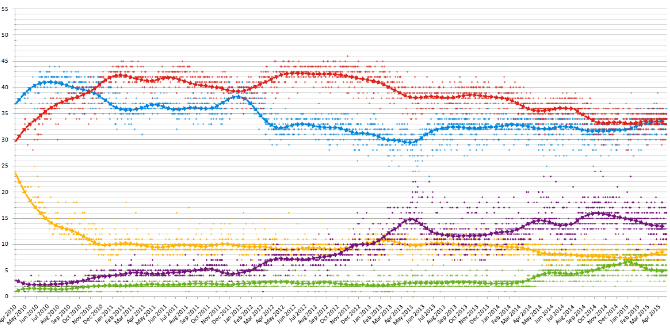On 23 June, representatives from the Western Balkans will meet EU leaders in Brussels ahead of a European Council summit. The meeting is viewed as an opportunity to revive the EU enlargement process in the region at a time when membership applications from Ukraine, Moldova, and Georgia are also being considered. Margit Wunsch Gaarmann argues that in light of the EU’s lack of political will for enlargement, the six Western Balkan states are right to consider their own model of regional cooperation.
Russia’s invasion of Ukraine has sparked debates about whether new countries should be granted candidate status for EU membership. Ukraine itself appears to be on the road to securing candidate status, with applications for membership from Moldova and Georgia also set to be considered at a European Council summit on 23-24 June. Yet this renewed interest in enlargement has also underlined the EU’s failure to resolve the status of the six Western Balkan countries whose enlargement prospects have ground to a halt.
In some countries, such as Germany, this realisation has prompted promises of a sharper focus on the Western Balkans, underlined by a number of high-profile political visits to the region. Chancellor Olaf Scholz even visited Southeast Europe before travelling to war-torn Ukraine. Other European politicians, such as Austrian Foreign Minister Alexander Schallenberg, have voiced fears of Russian destabilisation in the region if the six Western Balkan states are not tied more closely to the EU.
Meanwhile, French President Emmanuel Macron has emphasised that while he (still somewhat vaguely) envisions a European Political Community for countries like Ukraine, Georgia and Moldova, nothing should change the path towards membership that has already been laid out for countries in the Western Balkans.
All of these issues are likely to come to a head on 23 June at a meeting between EU and Western Balkan leaders in Brussels ahead of the European Council summit. However, the upcoming meeting becomes all the more interesting when observed with the assessment of Matteo Bonomi in mind, that the EU enlargement process in the Western Balkans has all the signs of being “clinically dead” and “kept artificially alive by summits with the EU.”
New ideas
A number of new ideas have been floated for breathing life back into the enlargement process. The so called ‘staged accession’ model has gained the most traction so far, which would essentially grant the six Western Balkan countries access to funding earlier in the accession process in return for concrete reforms.
Proponents of the model emphasise that incremental steps might enable the EU to break from the status quo and restore some of its credibility in the region. Opponents argue that a lot can be done within the existing framework, which has not yet been exhausted. They also point out that more profound changes to the accession process would require changes to existing treaties, which in turn would need to be ratified by 27 national parliaments over a period of years.
The region itself has also initiated a new approach, namely the Open Balkan initiative which aims to create a regional common market – a ‘mini-Schengen’ – for Albania, North Macedonia and Serbia, though it will ideally be expanded to eventually include all six Western Balkan countries. Considered a product of the region’s disappointment with the EU, it has been praised as a proactive move. Sceptics nevertheless fear that it could challenge the similar goals of the Berlin Process, which Chancellor Scholz has recently vowed to revive.
It remains to be seen whether the new initiative will be enough to prepare its members for the EU’s common market and significantly raise standards of living in the region. However, previous research on some of the Central and East European states that have joined the EU since 2004 has shown that “countries and industries that had greater regional integration in 2000 also integrated faster after EU accession”. This gives reason to believe the initiative may be worthwhile.
A lack of political will
While there are some small steps being made in the right direction, many observers still expect that the meeting on 23 June will fail to make any considerable progress, such as devising a roadmap towards membership with concrete milestones. Indeed, EU credibility has fallen to such an all-time low that nothing short of announcing the beginning of negotiations with Albania and North Macedonia is likely to be enough to change this narrative. Both states have received the green light to begin negotiations from the European Commission but have had their membership aspirations blocked by national vetoes for several years.
The reality is there is simply a lack of political will for the six Western Balkan states to be granted full EU membership. The trend for member states to misuse their veto powers to further their own domestic agendas will be difficult to reverse. This may become even more complex if Serbia, for instance, were to become a member state before Kosovo.
Moreover, calls to make more funding available for the six states as part of a ‘staged accession’ have also been countered by those who point to the many other challenges the EU needs to meet in the near future, such as support for Ukraine, Europe’s post-pandemic recovery, and the transition to climate neutrality. The kind of ‘game-changing geostrategic investment’ that is needed to make a real difference seems improbable in the current context.
The impasse also has important economic ramifications. The EU’s political-economic cooperation with the Western Balkans has for some time been creating divergence, rather than convergence. Instead of improving the lives of the people in the region by raising their income and strengthening democracy, the status quo increasingly acts as an incentive for people to emigrate.
As a recent study indicates, “the most effective way to improve regional cooperation… is to enact policies aimed at raising incomes.” By increasing the income in the six states through higher budget transfers, the region would in turn experience a boost in demand for local goods and services. The reality, however, is starkly different. In terms of purchasing power, the money allocated in the 2021-2027 budget cycle for the Instrument for Pre-accession Assistance (IPA III) is in fact a reduction of 1% from the previous IPA II cycle.
As living standards fail to improve and the promise of integration in the EU becomes increasingly distant, people are choosing to leave the region instead. According to World Bank estimates, between 1990 and 2019, 25% of the population of the six Western Balkan states opted to leave. As is often the case, the individuals leaving are highly educated, liberal-minded, young people who could be a driving force for bringing their home countries closer to a European future.
As Allison Carragher explains: “Brain drain decelerates EU economic convergence and the adoption of the fiscal criteria for membership. The transfer of wealth offsets the EU’s pre-accession assistance. And the hollowing out of the electorate reinforces a cycle of corruption and ineffective leadership. In sum, unmitigated brain drain and EU accession are mutually exclusive.”
What next?
The fact the region is pursuing its own initiatives to work towards regional economic cooperation is encouraging. Perhaps this will translate into greater will among local political elites for reconciliation, eventually initiating a solution for the unresolved issue of Kosovo’s independence and the creation of more unitary structures in Bosnia-Herzegovina.
If these developments generate economic improvements, there might be more political will in the six Western Balkan states to implement reforms regarding the rule of law, corruption, and foreign policy alignment, which are crucial to the EU accession process. In doing so, they would take huge strides toward becoming more prosperous, democratic, and stable states. This would not only benefit their own populations but would also make it possible for even the most enlargement-fatigued EU members to finally make good on their promises.
Note: This article gives the views of the author, not the position of EUROPP – European Politics and Policy or the London School of Economics. Featured image credit: European Council





